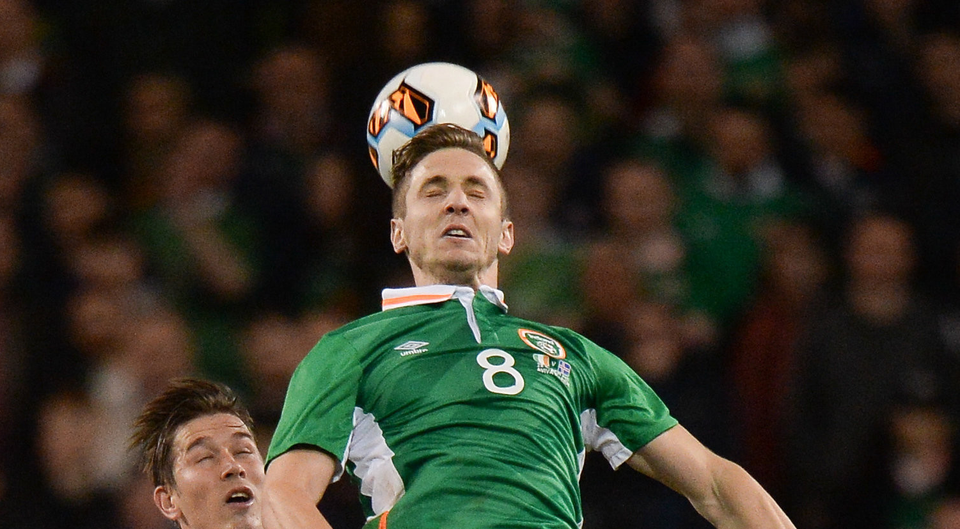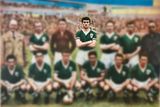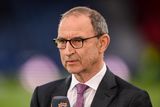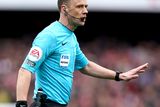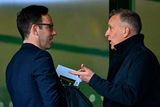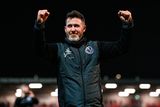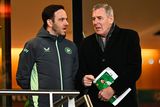'Jenny knew I was hiding the truth and she said I had to come clean' - Kevin Doyle sits down with Stephen Hunt
Doyle opens up to his former team-mate about his battle with concussion
Kevin Doyle, right, with his old friend and team-mate Stephen Hunt: ‘Not one time have I watched a game and thought, jeez, I’d love to be out there’. Photos: Frank McGrath
They were team-mates for Reading, Wolves and the Republic of Ireland, playing more than 200 games together, they were neighbours and now they are family. After a golf lesson with professional Jamie O'Sullivan at Rosslare Golf Club, Colin Young sat down with Stephen Hunt and Kevin Doyle as the pair reminisced and, for the first time, Doyle revealed the full story behind his decision to retire due to health fears over repeated head injuries sustained in his 15-year career.
STEPHEN HUNT: Can you remember when we first met?
Stephen Hunt and Kevin Doyle pictured on the 18th green at Rosslare Golf Golf Club. Picture Credit:Frank Mc Grath
KEVIN DOYLE: Yeah, I bought lunch. I'd signed for Reading a week or two before and when you came in I didn't know you, we'd never met and we went to the Oracle. And I remember paying.
SH: No, you didn't pay! We would have split the bill.
KD: We wouldn't have done the ching-chang then.
SH: No, we weren't that comfortable.
Kevin Doyle playing for the Republic of Ireland Photo: Sportsfile
COLIN YOUNG: What's ching-chang?
KD: Basically, it's like, rock, paper, scissors, which then developed into giving our credit cards to the waiter or waitress and we'd let them decide.
SH: As it went along we got more relaxed . . .
KD: You were good for me because you were another Irish lad there and you were from an area I knew, Waterford, and you knew a few of the Reading players.
SH: We used each other as motivation because you had just come from Cork and got straight into the team, so I thought if he can get in, I can. You did it in weeks, whereas I had slogged away for eight years. You came in with so much self-belief and calmness. I don't know what was going through your mind but you were never flustered. You have this demeanour where you look like you don't care. I know I am 100 miles an hour, but you are the total opposite. Why do you think you came over with that? It can't all be down to Pat Dolan.
KD: Ah no, on the outside that might have looked like the case but I was nervous and under pressure. I may have looked calm, but nothing was easy.
SH: You did hit the ground running though.
KD: I did. I had a good pre-season but when I went, no one knew me. There were 12 players there in the first week and then you came in.
SH: That's right. They weren't allowed to sign me until they had signed someone fashionable.
KD: (Laughs) I'd come in from the League of Ireland and I was nobody, which I had no problem with, even though I had done well in Ireland and I was leaving there as a sort of 'Cork City star'. To go from that to being like a kid coming over, having to prove myself again, wasn't easy. I knew it would be the case, but it was still tough.
SH: Do you think that professionalism came naturally - being in on time, being efficient, training well every day?
KD: Yeah, I hate being late and Pat taught us, if you want to be a professional footballer, you have to be this, you have to be that and get everything right. Being late has always been an absolute no-no.
SH: I was a character for the manager (Steve Coppell), that was my role, so I had to play it. And he would always use me for banter. You played the calm, efficient guy and I think that was why we got along.
KD: That was definitely the case in that first year. I'm sure I signed three contracts. We pushed each other. I think the second year we all took it more seriously. My fear was the fear of failure and having to come back to Ireland in a year. But I went to Cork as a nobody, so I knew the blueprint. I knew what I had to do. I knew I could convince people and change minds, I knew I wouldn't stay a nobody, I knew I could play well. I had belief in my own ability. Whether other people did or not didn't bother me, once you have your own belief, that's all that matters. Once I got to Reading, I remember saying to myself, I have no choice. I have to do this. The only alternative is failure, so I have to do it. It might not have shown in my passion or demeanour and it would take a lot to get me angry - a lot. I lose the head once a season, but I have to be really fucking angry.
SH: I can only remember the one time, which is when I nicked the ball off you for a penalty. Shane Long came over from Cork at the same time.
KD: We flew over, did our medical and all that together. At Cork, Shane was a youth team player and he had just got into the first team and the same at Reading, really. He did a bit of training with the under 18s and was slowly integrated into the first-team squad after Christmas. Shane was a help to us, even though he was younger. Neither of us had really been out of Ireland before so we had similar things to sort, like where to live, when to go back . . . all the shit that stresses me out. The football never stressed me out, it was always the other stuff, like setting up life in a new country. But then, that is the same in the last few months - all the life stuff you are not used to doing which you can't be arsed to do, but you have to do it.
SH: That surprised me with your fear of failure. I never got the feeling you cared that much because of your protective guard.
KD: That was my main motivation. That is why I would be down in Waterford with you in that first pre-season - fear of being last in running, last in the fitness tests. We ran our bollocks off in that summer, pushing cars, anything.
SH: Anything to give us an edge. We went to an ex-footballer, Richard Kennedy, who had us doing all sorts of mad shit.
KD: We thought, 'jeez, I've done all that, I can do anything in pre-season with Reading now'. It basically gives you an edge. We wanted to go back knowing we had done more than the other guy. That was my mindset: I had to be the fittest, or one of the fittest players. I remember that summer being driven by the fear of not scoring in the Premier League, of not playing, someone else coming in and scoring and having my place. And being a failure.
SH: It is easier, I think, to be motivated to train and work harder when things are going well. When things go wrong you need that mentality to continue to do that, because that is the path you've set yourself. We both taught each other that, I think. The easiest point was when we had apartments above and below each other.
KD: We lived a professional life.
SH: Bed, train, food . . .
KD: We went out every night. Never cooked once did we?
SH: Nah, every night, half six, ten quid.
KD: We were in Reading city centre, Italian round the corner usually, and I'm thinking we weren't ever on the piss, waking up with hangovers. We didn't go 'out-out', even on a Saturday night. It was a close club but it was not one where we would organise piss-ups together and be out on sessions. We were very lucky that way.
SH: The closest thing to Steve Coppell, personality-wise, was our captain Graeme Murty, who is managing Rangers now, he wouldn't be the sort of person to organise big drinking sessions and nights out, so we were lucky there really. He was a grandad at 30, like.
KD: He was good for us, because we were focused.
SH: You used to annoy me because you drank orange juice all the time and I would want a Coke just to relax but because you were drinking orange juice, I wouldn't have one. If I got one Coke a week, I'd be happy. To this day, I drink so much orange juice and the missus will be giving out to me.
KD: Yeah, I'd bully you into it. But then, I wouldn't eat bread. I was eating so healthily. My standards then were so much higher than they were later on in my career.
SH: That was an amazing first year, and then to go up into the Premier League. It was mad looking back, but it seemed so normal at the time. It is a family club; it is not a Newcastle with a big history and massive following, but it went on a great journey in terms of atmosphere, belief, momentum. It was an amazing time.
KD: We went into every game to win it. We never once went into a game to park the bus.
SH: No, never.
KD: We never worked on parking the bus or 'let's bore these out of it for 90 minutes', which I have done plenty of times since. It was always 4-4-2, play lads and go for it. We would lose some, and then we would win some and there was never a thought of 'right, we are going to have to sit in here, lads'. I don't remember ever doing that. Maybe I am being nostalgic and I have blanked it out, but I have no recollection of that.
SH: No, the manager never changed his message, until much later on, when we went man-for-man at Old Trafford and stuff . . .
KD: (Laughs) Oh yeah, I'd forgotten about that one.
SH: That was like a basketball match.
KD: Yeah, it was good fun. I remember later on in my career being told 'you have to drop in Kevin, you have to track their sitting midfielder and you have to sit on him', all this boring shit as a striker that you don't want to do. Never did I once do that at Reading. Whether it was with Longy later, or Dave Kitson, once the ball went past us, that was it. I never had to waste an ounce of energy. I just had to stand there and then I would be full of energy when the ball came back and I'd be chasing anything and everything, and covering then. But once it went out of our area, we never even thought about it. It's amazing how it has changed. The amount of running I did in the end. . . I did more running at the age of 34 than I ever did at 24 when I would be closing defenders down but I would never chase back to close other people down. Now strikers seem to do three or four different jobs, and some managers pay much more attention to strikers and what they do.
SH: When you were called up for Ireland, that was major motivation for me. It made me believe I could do it. We were flying at Reading, and that always helps. You don't get picked if you're struggling at the wrong end of the Championship. I knew it was a case of a good run in the first team and I had a chance. You helped me stay focused. It did my head in that you could never get excited but you were my go-to man. I knew you were determined and that goes a long way.
KD: I was always fairly relaxed about it (laughs). I was called up in October and scoring a few goals. I think I was injured when you came in against San Marino.
SH: Trap respected that we always went about it properly. We were all ears, always played to his instructions and always willing to listen. We did well for him, I think. We also helped Longy and made him tough but you showed him the way more than me because you're a striker. He would be the first to admit how much you helped him.
KD: I think Trap liked us, and Longy as well.
SH: We came to Wolves randomly didn't we? I don't think there was any great plan.
KD: I was there for a year while you were at Hull. We stayed up and you came in that summer.
SH: It was easy for me. 'Right, Kevin is there, I'll go to Wolves. He's in the team. I'll get in the team.' But you were a striker, so I was always in your shadow. I'd met your cousin Joanne by then too, so I think that helped. Marrying her made us even more competitive because the Doyle family is very competitive. Would you agree?
KD: It's just different.
SH: Yeah, different. Good word. I married into that mentality, because Joanne is very similar to you. She would be determined to do well but wouldn't tell anyone.
CY: What is your version, Kevin, of how they met?
KD: I set them up by saying 'there's my cousin, Stephen, you have absolutely no chance with her' and he, typically, plagued her for two years before she would give him a date.
SH: Laughs (a lot).
KD: That is it.
SH: I remember I had to chase for a date, that is true. Having been told it would not happen.
* * * * *
In 2015, his Wolves contract at an end, Doyle, aged 30, joined Colorado Rapids of the MLS. He went on to score 16 goals in 71 games and continued to be picked for Ireland.
SH: The night before you first went to Colorado, you stayed at my house and were having second thoughts. I was like, 'go, get on the flight'.
KD: I knew I could stay in England and the MLS was a risk because although I would not be writing off my Ireland career, my chances of starting would probably be slim. I said, 'I have a baby on the way, thanks very much but I won't be coming'. Then they offered to fly me over for a look, so I did the whirlwind tour over two days and loved it. I could not have been more impressed with everything. They sold it to me. They said I would want to come after having a look, and they were right. And it was the first time I had been really excited by a change in a good few years. Soccer becomes your job. You are living and playing in England and it becomes a very small place, you know all the clubs, grounds, managers, players, it's a merry-go-round and you see the same faces and places. Still, when that chance to go to America finally came, I was like, 'shit, I can't do it'. Every player is the same and I was very close to not going, mainly because of the new baby. If it was just the two of us, it wouldn't have been an issue but it was hard for my wife with a three-year-old and a new baby. Apart from anything, you do worry about the impact it will have on your football.
SH: Then you'd ring up, full of it, while I've been playing 4-4-2 for Mick McCarthy at Ipswich, busting my balls, Mick screaming at me in my ear and I can picture you in Colorado . . .
KD: Six months of the year, every day, shorts and flip flops . . . The lifestyle was fantastic, we loved it. After ten years in England, where everything does become familiar, I was genuinely excited by it. I'm not saying I would have gone through the motions if I had stayed but it would have just been another job and another English club. I was still backing into people and getting battered but with the excitement of a new league, new opponents, new stadiums, new players.
SH: And how did you find the MLS?
KD: It was hard. I was fitter than I have ever been. It was not a wind-down, it was a great place to finish my career. Forget moving to the other side of the world, new baby, settling in, forget all that. From the football side, it was tough. Think about it: every second week, every away game, you have five-hour flights, four days away from home. At first it was brilliant, I was travelling to new cities and you actually get to look around these places because they are very relaxed about what you do away from games. Second season, it's harder because you have seen places, the kids are getting older, so time away is tougher and with 25 games and pre-season, you are away nearly half the year. Jenny loved it even more than me - lifestyle, weather, nice neighbourhood, we made friends away from football. We lived in Birmingham, with West Brom, Villa, Birmingham, Wolves fans living near us - every day is intense. Over there, we met people and they would say, 'what, you play soccer and get paid?' which was obviously so refreshing. We had 18,000 fans but our rivals were an hour and a half flight away. Soccer is obviously small over there. It's like a drug in England; the pressure, the intensity, the rivalry in a place like the midlands. The football was hard, it was tough but I was weaned off that a bit.
SH: I had wind of the retirement but it was a complete surprise for most people. What is the story?
KD: I'd had concussion at different times over the years . . . I don't know if I ever had an official one. Did you ever had an official one?
SH: I had concussion once.
KD: But was it written down and you took two weeks off and all?
SH: No. Never.
KD: No, me neither, not in England, anyway.
SH: I had one with Ireland and, while they didn't laugh at me, they almost dismissed it and said 'you'll be fine'. It was playing against Italy in Bari, probably the best game I've ever played. I got concussion after about ten minutes.
KD: Oh yeah (laughs), I remember that. You were brilliant that day. At Cork City one day, I'd banged my head in training and while I was driving home, I rang the doctor to ask where I was and what I was doing. And then the next day he asked if I was fine, I said I was, so I trained. I was knocked out on the pitch at Reading once, got up and played the rest of the game. None of that would happen now. Anyway, I got concussion in the last game of pre-season in February. I had banged into the 'keeper, not a big bang at all, done it a million times but all of a sudden I was concussed. And I shouldn't have been for a bang like that. This was rated as an official concussion, which meant the club doctor had to send me to a neurologist and I was given two weeks off. I actually then came back to play the first game of the season but I was not right. I couldn't head a ball without not feeling well. When I told the medical staff all this and that, towards the end of the previous season, I'd told Jenny that every time I headed the ball I felt like shit, they pulled me out of the squad straight away. I hadn't really told them in the run-up to the game that week that I wasn't right. Looking back now, the number of times I'd headed the ball and taken a bang, the tolerance levels were getting lower and lower. Now I was at a stage where any little knock, and I was going to be concussed. The neurologist said, back in the day, I should have been taking two weeks off for these injuries but it's only really the last couple of years here, and in America, that it has really become an issue. Then, I probably went back in the next day and did heading practice!
SH: You can hear Wally Downes shouting 'don't turn your head'.
KD: I know, mad stuff. Your tolerance diminishes if you don't take the time out but it is being done properly now. I told the neurologist nothing about the heading problem, did the protocol, did the two weeks, and was ready to come back. The last test you have to do before you are given permission to play, is to head the ball - the physio throws a ball from 10 yards, 15 yards, 20 yards, and you head it back to him. I did it but said nothing. I went home to the wife and said 'I'm fucked, I can't head the ball.' I just felt dazed. You know when someone pumps a ball up too much, you head it, and it just doesn't feel right?
SH: Yeah, for 20 seconds you're walking around thinking 'what the hell?'
KD: Exactly. And that was every time I headed the ball, so I should have told them that. But I wanted to play, after two weeks sitting around doing nothing. I really thought it would settle down over the next few weeks and I'd be fine. I played and trained, but any header, and I just felt like shit. So I just didn't head the ball in training! At the end of training, when they were doing crossing and finishing, I'm 34 so I'd say, 'lads, I'm saving my legs, I'm going in' and no one thought anything of it, so I got away with it. I had headaches after most games, some would be OK, but sometimes I really didn't feel well. And it was starting to correlate but I thought I'd get through to the end of the MLS season, try get in the Ireland squad for the World Cup; Colorado were going to offer me one more season, you were desperate to get me to come back to England in January. That was the plan. One more year, I can get through it.
SH: Then you got concussion in September I think. Ashley Cole wasn't it?
KD: That's right. You would really not have expected it from something so routine. He was booting the ball clear, I was closing him down, as I turned, he hit the ball, a few yards from me, right on the back corner of my head and I instantly zonked out. Not knocked out, just gone, concussed. It was worse than I thought. I haven't seen it but the Rapids' physio had the clip on his computer and he said it was a bad one. My head just flopped and went 'bang, bang'. Then, it was weird. It was like I was looking down on myself playing. I went off, came back on for a few minutes and then just walked off the pitch and straight to the dressing room. I just was not with it at all. Even then, we were 1-0 down and I was thinking, 'I can't go off here, we're losing'. That's the stupid stuff you are thinking. Then the other side of me, when I'm looking down at myself, this strange feeling you are not in your body, and you think, 'this is not worth it'.
SH: It is hard to give up that real intensity of football. So then I presume you had all the tests and came clean?
KD: Jenny actually said, 'you are going to have to tell them everything'. She knew I was hiding the truth and she was fine initially with the plan to get through to the end of the season but she said I had to come clean. So when I went to see the neurologist, had the tests, I told him I'd been having these headaches for the last six months to a year, and he was not impressed - 'why didn't you tell me in the last meeting?' He changed immediately, doing more tests and told me I basically couldn't head the ball anymore. He said, 'if you can play without heading the ball, fine, play for one more year, but if you are going to head the ball, you should not play anymore.' Immediately, I thought: he did say I could be fine. It was just his opinion. He was not saying I couldn't play. He was just saying he didn't think I should. But the next collision, the next bang with the 'keeper, and the headaches will not go away and you will be stuck feeling concussed permanently. Big but.
SH: I didn't honestly realise it was that intense and serious.
KD: I wouldn't have retired. If he had said, 'you'll be grand, get on with it' I would have carried on. And maybe five or ten years ago, he would have said that. I even went for a second opinion, but he said the same thing.
SH: There will always be that element of a player not wanting to say anything because he'll be worried about losing his place, or having to stop playing.
KD: I know, but I think now you get so much education. In pre-season, you get talks with doctors that we would not have had ten years ago. Even now, I would think after a bang on the head 'am I concussed?' 'What am I doing?' No one questioned me, it was left to me but it is changing, in my experience. The thing I learned from America was health came first. It was never anything else.
SH: Do you think players put their health first? It has changed . . .
KD: I would like to think they would, but you know when you are in the first team, you've scored three goals, the team is winning. You can get away with it and players have done it throughout their careers. You can get away with concussion, you can play, you can do everything, but you just won't feel great. Now we know you shouldn't play on and it is not worth it.
SH: Maybe managers need to be more sympathetic.
KD: To be fair, Stephen, the club were brilliant. They said, take all the time off you need. I went to see the director of soccer, an Irish guy, Pádraig Smith, and he said, 'listen, if you are retiring, retire. Do not worry about anything.' But I felt guilty, still. We were second bottom of the league and I didn't want it to look like I was just giving up. I wasn't giving up!
SH: And he loves you. But how did you feel, deep down?
KD: I would prefer someone to have said, 'you must retire'. It was left up to me and part of me did think, I could get away with it. And, after a few weeks of not doing anything, I started to feel really good again. And I felt fresh and wanted to go back and play, and then when we were in with a shout of the World Cup finals, I was desperate to stay involved with the squad; I might not have been selected, but just have a chance of maybe going to Russia . . .
SH: I remember talking to you before the announcement and I said, 'you need a clear conscience, can't retire, if you have a chance of the World Cup.'
KD: I know. We're out now anyway. But I spoke to a few people and I remember Jenny saying, 'why are you doing this? For one year? Are you crazy? You're 34, you've had a great career, what more are you going to get out of this?' And, you know what? She was right. But you just don't want to let go. From being told, to making the announcement, was probably six weeks. And when I told my parents, they both said 'what are you waiting for? Just retire.'
SH: How are you feeling now?
KD: Great, not a bother. If I bang my head messing about, I immediately feel like shit so I do have to avoid that. And I really notice it now, but that's maybe because I am more aware of it.
SH: And do you worry about the long-term effects?
KD: No, not at all. This is the reason I did retire. I made the decision because of that. I feel my form and humour are just way better. And I think Jenny sees it too. One of the big questions I had was how to announce it. I thought about saying nothing. I knew people would be interested and part of me was happy not to say anything because I thought, 'do I want to be answering questions about head injuries for the rest of my life?' But I wanted to give a reason.
SH: You must be glad you did it that way though.
KD: It would have come out and obviously there was major interest in the beginning. The requests for interviews was mad - nothing in America because American footballers, soccer players, they have retired with it. It is not a big deal. But here, because I had played in England and I'm Irish, I still hadn't appreciated the interest it would generate.
SH: Have you watched the Alan Shearer documentary about dementia?
KD: It's on the planner. My mother has it recorded and I am going to watch it.
SH: Are you avoiding it?
KD: No, I just haven't made time yet. I am actually really interested to see it. That's more like it. I have been told about it and read about it and I know it will be worth watching. I don't really want to see long-term effects on people, but like I said, that is why I retired now. Five years ago, I would not have retired. Maybe I have made it easier for the next person and people will be more aware of it. All these things can only be good in the long run.
SH: And do you miss anything?
KD: Touch wood, no. I went to the home leg of the Ireland v Denmark game with my son and I loved it. As an adult, I have not been able to walk up to an Ireland game, have dinner, have a beer, watch the match. I thought beforehand, I would not be happy and want to be out on the pitch, but it was great and the little fella was so excited and loved it. This is my off-season anyway, so it may change when pre-season starts and I don't receive the emails telling me where I have to be on January 18. But, not one time have I watched a game and thought 'jeez, I'd love to be out there'.
SH: How many times have you been asked 'what's the plan?' You are too intelligent and have too much going on in your head to just be having golf lessons with Jamie every week.
KD: I won't be doing that. You know what it's like when you've retired. Every single person asks 'what are you doing now?'
SH: That is the worst bit . . . It wrecked my head for the first three or four months, even though I knew . . .
KD: Give me five minutes. I want to enjoy this. It is the most natural thing for people to ask, it's just general conversation, but it drives you mad. My plan all along as a footballer was to do well, and make enough money so that when I retired I wouldn't need a plan, do you get me? That sounds wrong but I didn't want to be panicked into playing soccer, it stops and then 'shit, what am I going to do?' That was the fear again I'm talking about. Now, with various revenue streams, thankfully I can take my time and decide what I want to do and I have given myself time. I deferred studying business at college when I was younger, I could do that, or the coaching badges, or my dad breeds horses, and I could get more involved in that. There are lots of different things for me to pick through and luckily there is no rush.
SH: And I was the opposite. I had to do something straight away and be active.
KD: Yeah, but you can't sit still for five minutes. The FAI have been on to me saying, 'do your badges', this course, that course, but I want to wait. I don't want to do something for the sake of it. I have done some TV, which I didn't really plan, but I got asked and thought it would be good practice.
SH: My advice would be enjoy it but don't waste it. You have too much going on in your head.
KD: I love being home in Wexford. All along the hardest thing for me was living away from home. My dream was to live here. We have really close family and consciously built a house seven years ago to kind of force ourselves to come home because you can get comfortable living away, whether it is Colorado, which we loved, or England. When retirement came, we had to come back, or it gave us another reason. Wexford is such a beautiful place, which is why you have made it your home, Stephen. The weather isn't always the best, but it is a lovely county to live in.
